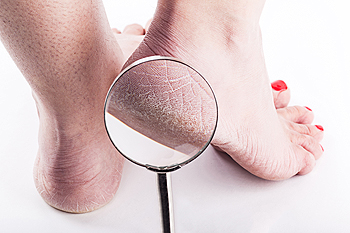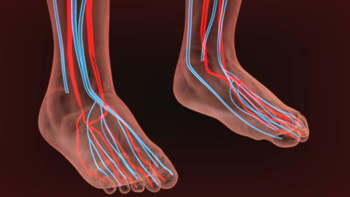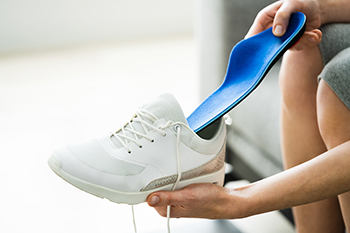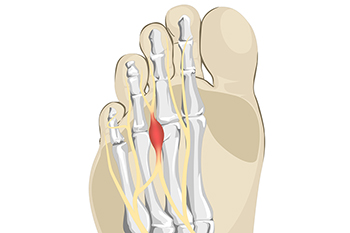Items filtered by date: September 2023
Managing Severely Cracked Heels

Heel fissures are cracks that can develop on your heels, causing pain and potentially leading to infection if left untreated. The root cause of heel fissures often stems from the skin's lack of moisture. This can be the result of several underlying conditions, including fungal infection, diabetes, psoriasis, and eczema. The development of heel fissures can be accelerated by other factors as well, such as prolonged standing, regularly wearing open back shoes, and obesity. Prevention tips include applying a rich, hydrating foot cream consistently to maintain soft and supple skin. This can help to prevent cracked heels from turning into fissures. Regular exfoliation of the heels with a pumice stone after bathing helps to remove dead skin cells and promote healing. Preventing heel fissures involves staying well-hydrated, opting for supportive footwear, and maintaining a healthy weight. In severe cases, especially for persistent heel fissures that may have become infected, it is suggested that you make an appointment with a podiatrist as quickly as possible.
If the skin on your feet starts to crack, you may want to see a podiatrist to find treatment. If you have any concerns, contact Dr. Michael A. Wood from Foot Health Institute. Our doctor can provide the care you need to keep you pain-free and on your feet.
Cracked Heels
It is important to moisturize your cracked heels in order to prevent pain, bleeding, and infection. The reason cracked heels form is because the skin on the foot is too dry to support the immense pressure placed on them. When the foot expands, the dry skin on the foot begins to split.
Ways to Help Heal Them
- Invest in a good foot cream
- Try Using Petroleum Jelly
- Ease up on Soaps
- Drink Plenty of Water
Ways to Prevent Cracked Heels
- Moisturize After Showering
- Skip a Shower
- Keep Shower Water Lukewarm
- Don’t Scrub Your Feet
If you are unsure how to proceed in treating cracked heels, seek guidance from a podiatrist. Your doctor will help you with any questions or information you may need.
If you have any questions, please feel free to contact one of our offices located in Lansing, and Chicago, IL . We offer the newest diagnostic and treatment technologies for all your foot care needs.
The Feet Can Be Affected by Poor Circulation

Symptoms that are associated with poor circulation can include cold or discolored feet, and there may be numbness or a tingling sensation. Poor circulation can come from closed, hardened, or narrowed blood vessels that can prevent adequate blood, oxygen, and nutrients from being transported through the body. There may be underlying reasons that can lead to poor circulation. These can include Raynaud’s disease, which can limit blood flow to the fingers and toes, and acrocyanosis, causing the toes to turn blue from constricting blood vessels. Additionally, poor circulation is common among diabetic patients as a result of damaged blood vessels. Poor circulation may also affect people who smoke, are inactive, or who have high cholesterol or blood pressure. Mild relief may be found when the feet are massaged, relaxation techniques are practiced, and physical activity is increased. If you have symptoms of poor circulation, it is suggested that you confer with a podiatrist who can offer you the correct treatment options.
While poor circulation itself isn’t a condition; it is a symptom of another underlying health condition you may have. If you have any concerns with poor circulation in your feet contact Dr. Michael A. Wood of Foot Health Institute. Our doctor will treat your foot and ankle needs.
Poor Circulation in the Feet
Peripheral artery disease (PAD) can potentially lead to poor circulation in the lower extremities. PAD is a condition that causes the blood vessels and arteries to narrow. In a linked condition called atherosclerosis, the arteries stiffen up due to a buildup of plaque in the arteries and blood vessels. These two conditions can cause a decrease in the amount of blood that flows to your extremities, therefore resulting in pain.
Symptoms
Some of the most common symptoms of poor circulation are:
- Numbness
- Tingling
- Throbbing or stinging pain in limbs
- Pain
- Muscle Cramps
Treatment for poor circulation often depends on the underlying condition that causes it. Methods for treatment may include insulin for diabetes, special exercise programs, surgery for varicose veins, or compression socks for swollen legs.
As always, see a podiatrist as he or she will assist in finding a regimen that suits you. A podiatrist can also prescribe you any needed medication.
If you have any questions, please feel free to contact one of our offices located in Lansing, and Chicago, IL . We offer the newest diagnostic and treatment technologies for all your foot care needs.
Footwear Features for Hospital Workers

Comfort is important when it comes to shoes for hospital workers, and safety is even more so. A cushioned insole and a well padded interior are essential in providing all day comfort during extended shifts. Standing and walking for hours can take a toll on your feet, and having shoes that offer ample cushioning can help to reduce fatigue and discomfort. Having adequate arch support and a stable midsole can help maintain proper foot alignment and reduce strain on the feet and legs. Wearing shoes that have slip resistant outsoles are a must in healthcare settings, where floors can be wet or slippery. Breathability is also essential to keep your feet dry and comfortable throughout the day. Lightweight fabrics allow air circulation, reducing the risk of sweating and odor. Finding shoes constructed with high quality materials helps ensure that your shoes can withstand daily use and the occasional spills or accidents that are part of the job. For more information on finding the right shoes for hospital workers, it is suggested that you consult with a podiatrist.
While working on the feet, it is important to take the proper care of them. For more information about working on your feet, contact Dr. Michael A. Wood from Foot Health Institute. Our doctor will treat your foot and ankle needs.
Working on Your Feet
Standing on your feet for long periods of time can cause stress and pain in your feet. Your whole body may experience change in terms of posture, back pain, bunions, callouses and or plantar warts. There are ways to avoid these conditions with proper foot care, smart choices and correct posture.
Positive Changes
Negative heeled shoe – Choosing this shoe type places the heel slightly lower than the ball of the foot. These are great for overall foot health. Find shoes that fit you correctly.
Go barefoot – Our feet were not designed to be enclosed for all hours of the day. Try to periodically expose your feet to air.
Eliminate Pain
Foot Exercises – Performing simple exercises, incorporating yoga and doing stretches are beneficial. This will allow increased blood flow to the area and muscles of the foot.
Achilles tendon – Stretching the foot out flat on the floor will relax the calf muscles and tendon. These exercises can be performed almost anywhere. Make sure you add these exercises to your daily regimen.
With a little bit of this information and knowing more about foot health, you will notice changes. Foot stretches and proper footwear will help with pain and prevent further issues.
If you have any questions please feel free to contact one of our offices located in Lansing, and Chicago, IL . We offer the newest diagnostic and treatment technologies for all your foot and ankle needs.
Understanding Morton’s Neuroma and Its Causes

Morton's neuroma, a condition that often goes undetected, can cause considerable discomfort and disrupt daily life. This condition involves a thickening of the tissue around a nerve that runs between the third and fourth toes, typically causing a sharp, burning pain in the ball of the foot. The causes of Morton's neuroma are multifaceted, often arising from repeated stress on the feet, and ill-fitting footwear that squeezes the toes. Additionally, reasons why Morton’s neuroma may develop can include having certain foot deformities that lead to pressure on the nerves. High heels and activities that involve repetitive forefoot impact can exacerbate the condition. Recognizing the factors that contribute to Morton's neuroma is the first step in seeking relief and adopting preventive measures to ensure continued foot health. If you have pain in this part of your foot, it is suggested that you confer with a podiatrist who can accurately diagnose and treat Morton’s neuroma.
Morton’s neuroma is a very uncomfortable condition to live with. If you think you have Morton’s neuroma, contact Dr. Michael A. Wood of Foot Health Institute. Our doctor will attend to all of your foot care needs and answer any of your related questions.
Morton’s Neuroma
Morton's neuroma is a painful foot condition that commonly affects the areas between the second and third or third and fourth toe, although other areas of the foot are also susceptible. Morton’s neuroma is caused by an inflamed nerve in the foot that is being squeezed and aggravated by surrounding bones.
What Increases the Chances of Having Morton’s Neuroma?
- Ill-fitting high heels or shoes that add pressure to the toe or foot
- Jogging, running or any sport that involves constant impact to the foot
- Flat feet, bunions, and any other foot deformities
Morton’s neuroma is a very treatable condition. Orthotics and shoe inserts can often be used to alleviate the pain on the forefront of the feet. In more severe cases, corticosteroids can also be prescribed. In order to figure out the best treatment for your neuroma, it’s recommended to seek the care of a podiatrist who can diagnose your condition and provide different treatment options.
If you have any questions, please feel free to contact one of our offices located in Lansing, and Chicago, IL . We offer the newest diagnostic and treatment technologies for all your foot care needs.

